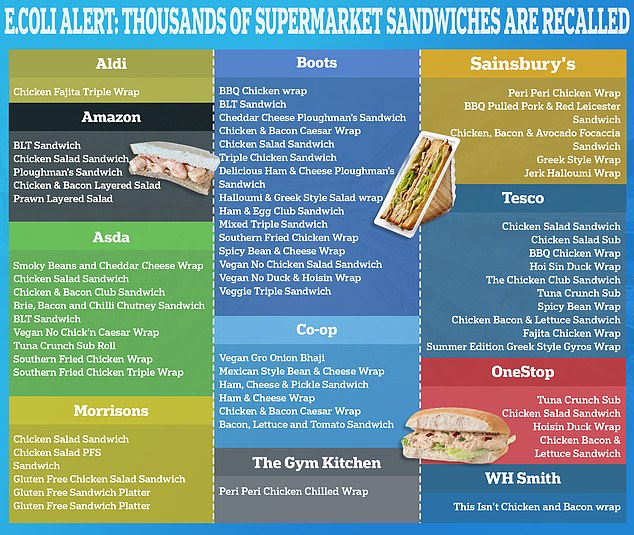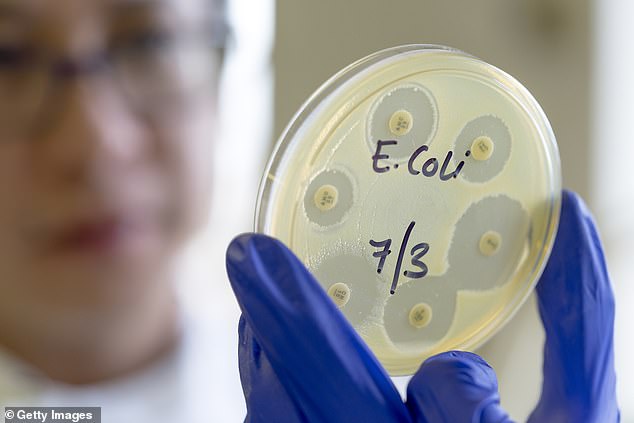A man claimed he was temporarily unable to walk after consuming a now-recalled sandwich that was feared to be contaminated with a rare strain of E. coli.
John Daniels, from Macclesfield in Cheshire, said he suffered severe diarrhea and passed blood two days after consuming Boots’ £4.99 chicken and bacon Caesar wrap in May.
After being rushed to hospital, the 66-year-old man was diagnosed with the virus.
But just five days after being discharged, he suddenly experienced severe dizziness, weakness and could not even walk without assistance.
Tests later revealed that he suffered from a nerve-damaging condition, Guillain-Barré syndrome, after his E. coli infection.
John Daniels, from Macclesfield in Cheshire, said he suffered severe diarrhea and passed blood two days after consuming Boots’ £4.99 chicken and bacon Caesar wrap in May. After being rushed to hospital, the 66-year-old man was diagnosed with the virus.

‘Do not eat’ alerts have been placed on more than 60 products sold at companies including Asda, Morrisons, Tesco, Boots and Sainsbury’s.
GBS can cause paralysis of the arms, legs or face and leave patients in crippling pain.
Currently, more than 60 sandwiches, wraps and salads sold in 11 major stores have been slapped with ‘do not eat’ alerts for fear that they may contain Shiga toxin-producing E. coli (STEC).
Food safety officials have said they are “confident” that a type of butter lettuce, called Apollo, is behind the outbreak of the virus that causes diarrhea.
However, exactly how they became contaminated has not yet been established.
Recalling his ordeal, Mr Daniels said: ‘The past month has been nothing short of traumatic.
“I had never felt this bad before so I knew something was very wrong, but to be told I had E. coli and then Guillain-Barré syndrome was a huge shock.
‘My condition went from bad to worse as I developed complication after complication.
“I’m not physically well yet, and I don’t know if I ever will be, and hearing how many others have been affected is deeply disturbing.”
“I just hope something is done to prevent this from happening to anyone else.”
In severe cases, GBS can cause life-threatening problems, such as breathing difficulties and blood clots. This condition kills approximately one in 20 people.
Around one in 50,000 Britons and Americans develop GBS each year, usually after an infection when the immune system becomes overactive.
The packaging that Daniels claimed triggered his infection was recalled last week by manufacturer Greencore Group, which produces 1.7 million sandwiches daily, making them the world’s largest manufacturer.
At the time, a company spokesperson said: “As a precautionary measure, we have voluntarily recalled a number of sandwiches and wraps due to a potential food safety risk.”
“Greencore adheres to the highest food safety standards and we are working closely with the FSA and our suppliers to better understand the possible source of any potential problems.”
Greencore Group today told MailOnline it had nothing further to add.
A Boots spokesperson said: “In response to the Greencore product recall on June 14, 2024, Boots took the precautionary step of recalling a number of its sandwiches and wraps.
“There have been no positive results for STEC E. coli in any of our product testing by the Food Standards Agency.”
It comes as more than 200 Britons are known to have been affected by Shiga toxin-producing E. coli (STEC), a rare strain of the virus that causes diarrhea in just over two and a half weeks.
At least 67 people have been admitted to hospital.

The UK Health Security Agency typically records around 1,500 confirmed STEC infections in a year. It is recommended that anyone who experiences symptoms of STEC stay home from work or school until 48 hours after they stop vomiting or having diarrhea to reduce the risk of spreading the infection to others.
The UK Health Security Agency (UKHSA) said today that a total of 211 cases were recorded between May 25 and June 11.
Of these, 147 were in England, 27 in Wales and 35 in Scotland.
Only two cases have been recorded in Northern Ireland, although authorities say this individual probably contracted the virus in England.
Victims include children as young as two years old, although the majority are young adults.
The UKHSA typically records around 1,500 confirmed STEC infections in a year.
Daniels said he has lost about half a kilo in weight and that medical teams continue to monitor him.
He has now also instructed his lawyers to investigate the cause of the E. coli outbreak.
Sarita Sharma, specialist public health solicitor at Irwin Mitchell, said: “What John has suffered in recent weeks is very worrying, and he is understandably upset and distressed by what he has been through as a result of the E. coli infection. “.
‘To hear that over 200 people have also been affected is really shocking.
‘E.coli is a bacteria that can cause foodborne illness, causing gastric symptoms and, in some cases, like John’s, can lead to other serious health conditions.
‘The UK Health Security Agency is investigating and has found that John’s illness is likely due to the recalled sandwich.
“It is now vital, where appropriate, that lessons are learned going forward to keep consumers safe.”

